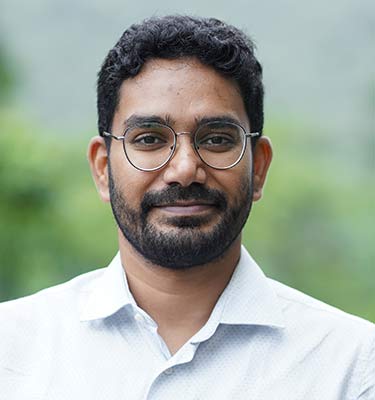
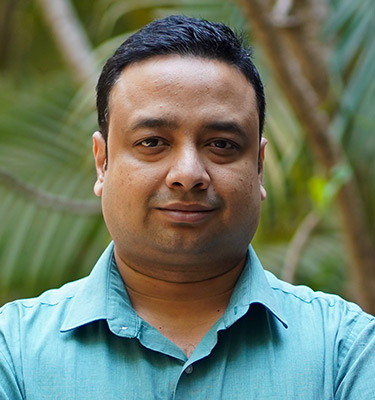
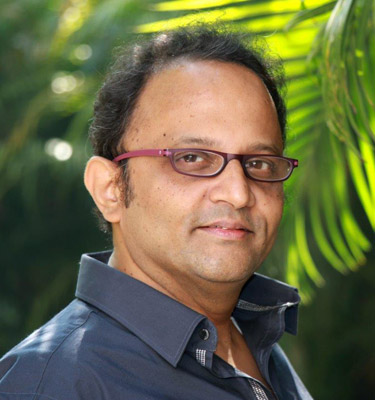
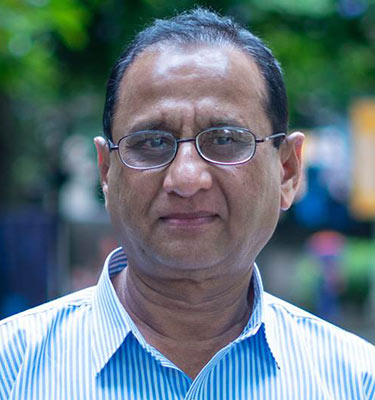
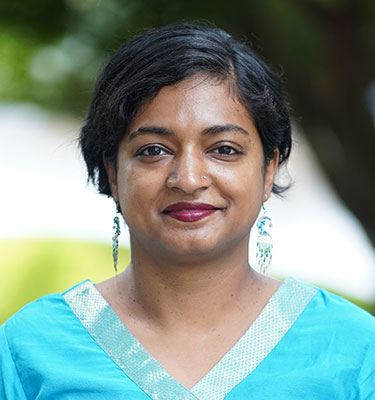
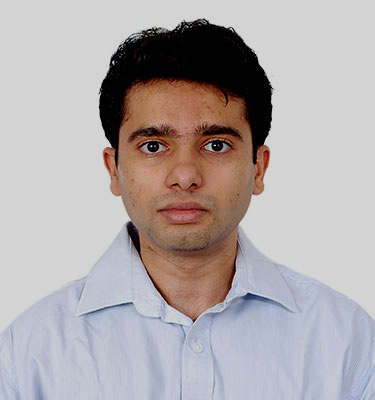

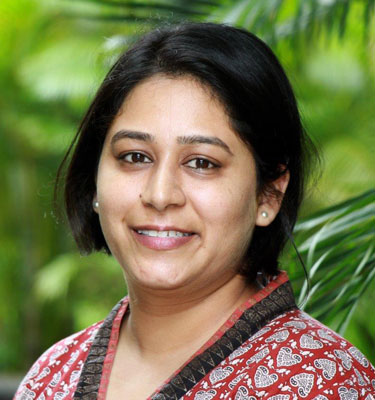
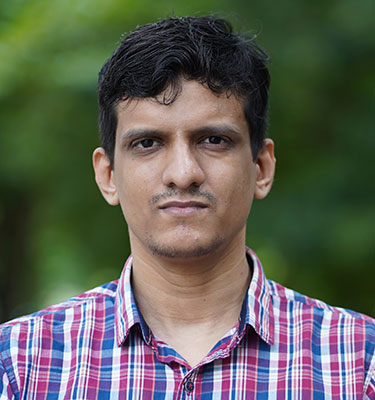
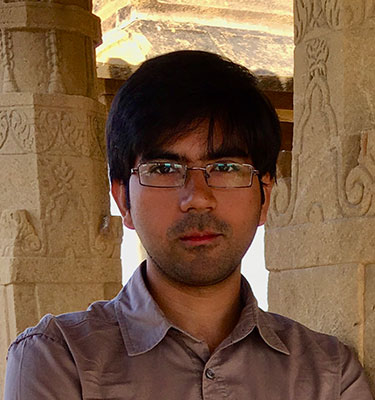
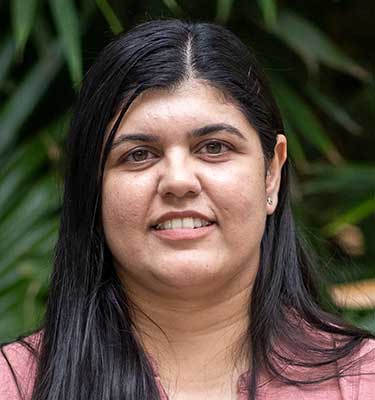
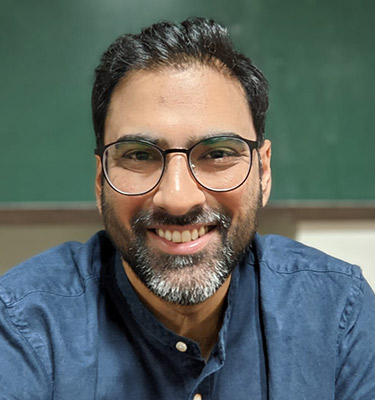

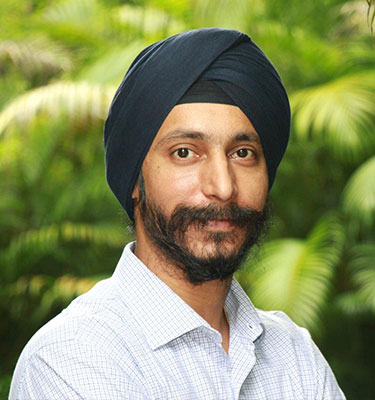
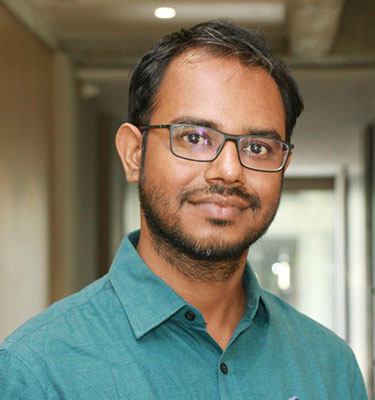
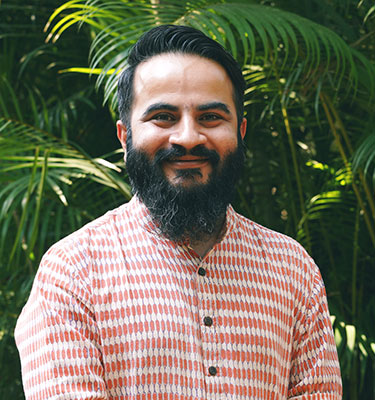
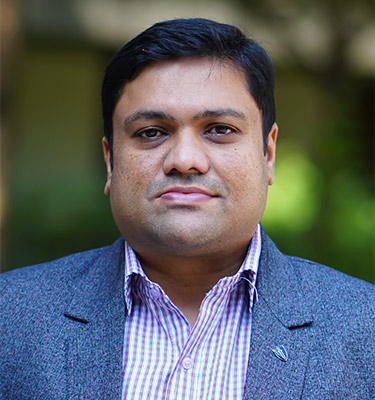


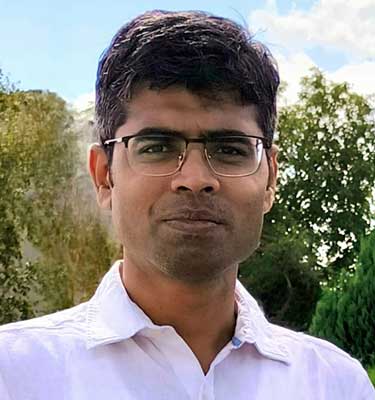

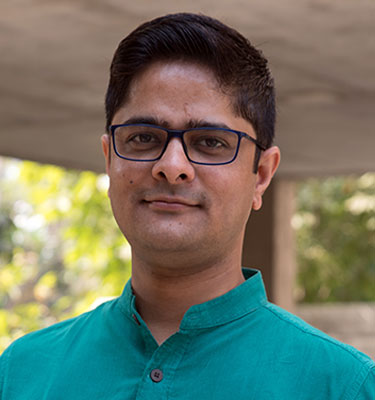


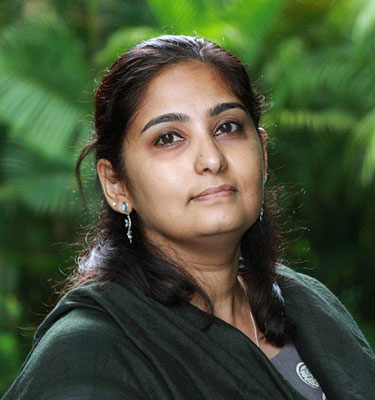
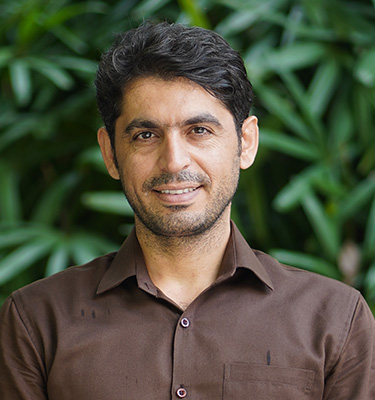
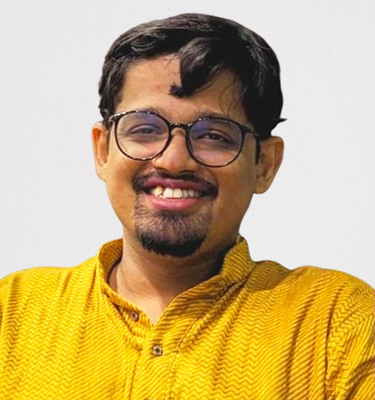
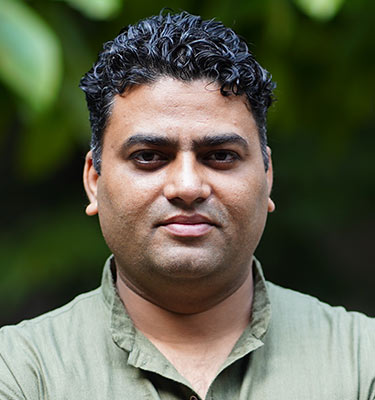
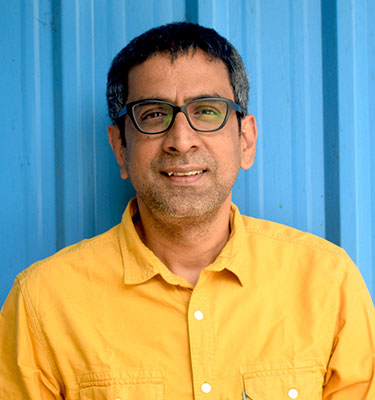
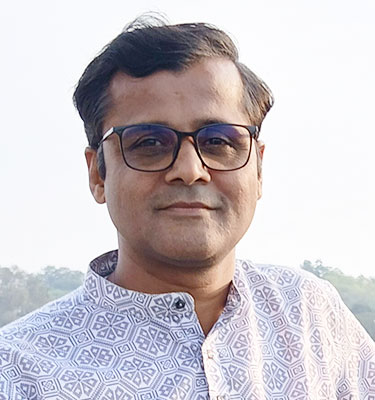

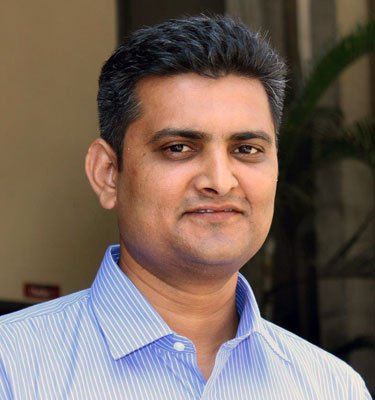
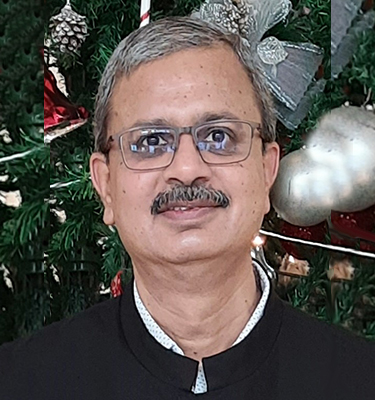
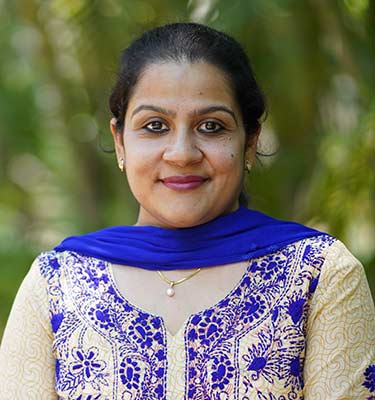

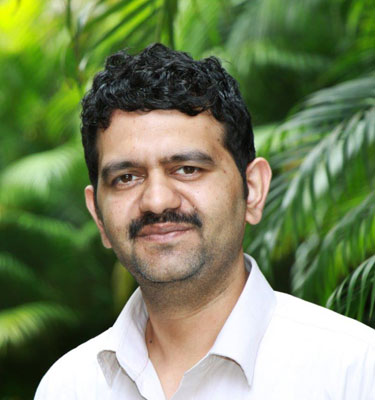
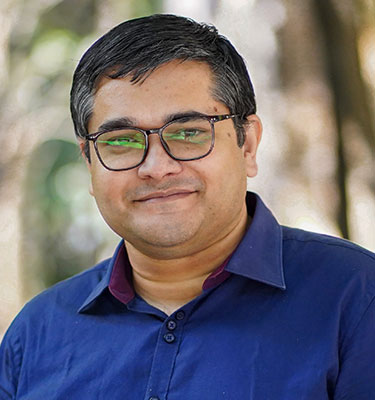

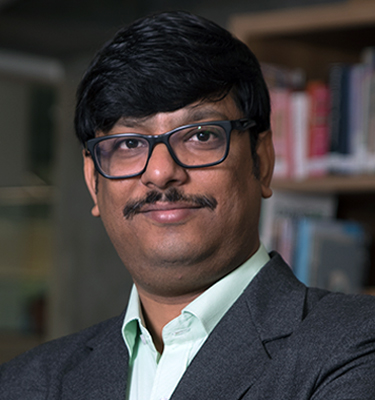
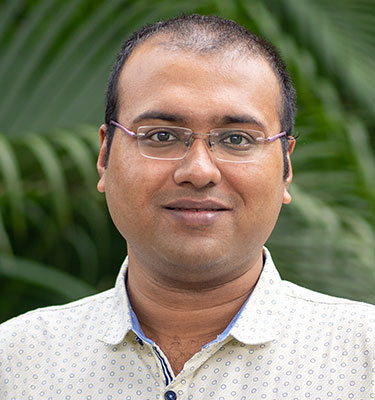
FACULTY
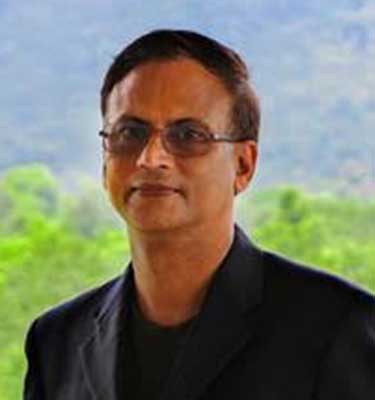
Prof. Pankaj Jain
Designations and Degrees
Professor Pankaj Jain, PhD, is a renowned academic leader whose work has resonated globally in the fields of Sustainability, Jain Studies, Film Studies, and Diaspora Studies. With over 30 years of experience in academia and the corporate world, he has held the position of Head of Department (HoD) for Humanities and Languages. As the Director of The India Centre at FLAME University, he has led numerous initiatives to promote Indian culture and scholarship, including international conferences, research projects, and cultural events, leaving an indelible mark on the global academic landscape.
Before his tenure at FLAME University, Professor Jain served as the founding co-chair of the India Initiatives Group and as an Associate Professor in the Departments of Philosophy, Religion, and Anthropology at the University of North Texas, a prestigious Tier 1 American university. His diverse expertise, which spans various disciplines, is a testament to his versatility and depth of knowledge. He earned a Ph.D. from the University of Iowa and an M.A. from Columbia University. He also holds a B.E. in Computer Science from Karnatak University, highlighting his multidimensional understanding and proficiency.
Books
Professor Jain's eighth book, Jainism: From Bhagwan Mahavira to Mahatma Gandhi (2025), published by Manohar Publishers and the Indian Institute of Advanced Study, is his latest contribution. His seventh book, Visual Anthropology of Indian Films: Religious Communities and Cultural Traditions in Bollywood and Beyond (2024), is an anthology of his articles. He coedited the Encyclopedia of Indian Religions (2022) and Indian and Western Philosophical Concepts in Religion (2023). His earlier monographs have made significant contributions to their respective fields, including Modern Jainism: A Historical Approach (2023), Dharma in America: A Short History of Hindu-Jain Diaspora (2019), award-winning Dharma and Ecology of Hindu Communities: Sustenance and Sustainability (2011), and Science and Socio-Religious Revolution in India: Moving the Mountains (2015).
Articles and Media Presence
His articles and quotes have been prominently featured in esteemed publications such as The Huffington Post, The Washington Post, The Times of India's Speaking Tree, and Patheos. These platforms have provided a global audience access to his research and ideas, contributing to the international discourse on Indian culture, religion, and sustainability. Additionally, Dr. Jain is frequently quoted in various American and Indian media outlets, including The History Channel, Forbes India, BBC Hindi, ABC News, Dainik Bhaskar, Rajasthan Patrika, Free Press Journal, and NBC News. In July 2020, The New York Times interviewed him; in 2019, Morgan Freeman interviewed him for the National Geographic series "The Story of God," which featured a segment on Jainism.
Accolades
Professor Jain's contributions have been widely acknowledged and have received numerous accolades, underscoring his credibility and authority in his field. These include the prestigious Fulbright-Nehru Fellowship for Environmental Leadership, which recognizes his pioneering work in promoting sustainable practices in Indian communities; the Wenner-Gren Grant, which supports his research on the Jain diaspora; and the IIAS Fellowship, which acknowledges his interdisciplinary approach to studying Indian religions. He was also nominated for the Sustainability Leadership Award from Mnemosyne Institute, a testament to his commitment to environmental conservation. His first book was recognized with several American awards, further solidifying his standing in the academic community.
Social Media Outreach
Outside of academia, Professor Jain maintains an active presence on social media. He can be found on various platforms using the handle @ProfPankajJain. His podcast, #DiscoverIndia, available on Spotify, Apple, YouTube, Alexa, Audible, Gaana, and other platforms, covers diverse topics related to Indian culture, religion, music, and sustainability. These include discussions on the role of Hinduism and Jainism in promoting sustainable living, explorations of the cultural significance of Indian festivals, and interviews with scholars and practitioners in the field. Through this podcast, he aims to make academic research more accessible, demonstrating his commitment to public engagement.
Other Interests
He avidly explores Indian music, movies, literature, and heritage sites.
Monographs
- Jain, Pankaj. Jainism: From Bhagwan Mahavira to Mahatma Gandhi (2025). Manohar Publishers & Indian Institute of Advanced Study.
- Jain, Pankaj. Modern Jainism: A Historical Approach. Dordrecht, the Netherlands: Springer, 2023. New Delhi, India: Manohar Publishers, 2025.
- Reviewed/featured in New Books in Indian Religions Podcast
- Jain, Pankaj. Dharma in America: A Short History of Hindu-Jain Diaspora. London, England: Routledge, 2020
- Reviewed/featured in Nidan, Brill Journal of Diaspora Studies, Routledge Journal of South Asian Diaspora, Rupkatha, Swarajya, Hindu American Foundation’s Podcast, AAR’s Reading Religion, and New Books in Indian Religions Podcast
- Jain, Pankaj. Science and Socio-Religious Revolution in India: Moving the Mountains. London, England: Routledge, 2018
- Reviewed in The International Journal of Hindu Studies, Worldviews, Swarajya, IndicToday, and The British Journal for the History of Science
- Jain, Pankaj. Dharma and Ecology of Hindu Communities: Sustenance and Sustainability. Farnham, Surrey, England: Ashgate, 2011. London, England: Routledge, 2016
- Winner of the 2012 DANAM Award and 2011 Uberoi Foundation Award. Reviewed in the Journal of Asian Studies, International Journal of Dharma Studies, Environmental Values, Food, Culture & Society, International Journal of Hindu Studies, Oxford Journal of Hindu Studies, Journal of Hindu Christian Studies, Localities, Philosophy East & West, Religious Studies Review, Sophia, and Worldviews: Global Religions, Culture, & Ecology. Also reviewed in Asia Times & IndiaFacts and cited in LA Times, Swarajya, and Indian Express.
Edited Journal, Volume, and Encyclopedia
- Jain, Pankaj, Jefferey D Long, and Sanchari Basu Chaudhuri (ed.). “Hinduism and Visual Cultures,” International Journal of Hindu Studies, 2026
- Jain, Pankaj (ed.). Visual Anthropology of Indian Films: Religious Communities and Cultural Traditions in Bollywood and Beyond, Routledge, 2024
- Reviewed/featured in New Books in Indian Religions Podcast
- Jain, Pankaj, and Jeffery D. Long (ed.). Indian and Western Philosophical Concepts in Religion. Bloomsbury, 2023
- Reviewed/featured in New Books in Indian Religions Podcast
- Long Jeffery, Sherma Rita D., and Jain, Pankaj (ed.). Encyclopedia of Indian Religions. Springer, 2022
- Reviewed/featured in New Books in Indian Religions Podcast
- Jain, Pankaj (ed.). “Hinduism and Materiality,” Nidan: International Journal of Indian Studies, vol. 23, 2011
Academic Articles/Essays
- Hegde, Chirag and Pankaj Jain. “Kantara (2022) through the Lens of Indian Religious and Environmental Philosophy,” in Worldviews: Global Religions, Culture, and Ecology. Vol. 29, Issue 3, pp. 271-273.
- Sharma, Shikha, and Jain, Pankaj. “Trishagni (1988): A Review Based on the Jewel Net of Indra, the Buddhist Notion for Environmental Sustainability,” in Worldviews: Global Religions, Culture, and Ecology, Vol. 29, Issue 3, pp. 263-270.
- Tiwari, Gyanendra, and Pankaj Jain. “The Ecodharmic Significance and Liminal Experience of the Kumbh Mela,” in Worldviews: Global Religions, Culture, and Ecology, Vol. 29, Issue 3, pp. 223–240.
- Jain, Pankaj. “Trishagni (1988): A Review Based on the Jewel Net of Indra, the Buddhist Notion for Environmental Sustainability,” in Worldviews: Global Religions, Culture, and Ecology
- Jain, Pankaj. “Flora and Farming in Jainism,” in Worldviews: Global Religions, Culture, and Ecology, 2025, Vol. 29, Issue 2, pp. 170-179.
- Tiwari, Gyanendra and Pankaj Jain. “Maharaja Burger – Mad Cows, Holy Cows: Comparative Bovine Ecology from India and the UK,” in Worldviews: Global Religions, Culture, and Ecology, 2025, Vol. 29, Issue 2, pp. 181-185.
- Kapoor, Khushi, and Pankaj Jain. “Exploring the Religious and Environmental Allusions in Ram Teri Gaṅgā Maili,” in Worldviews: Global Religions, Culture, and Ecology, 28.3, 2024, pp. 295–301.
- Jain, Dhwaj, Yukti Khaitan, and Pankaj Jain. “Ship of Theseus: A Jain Monk’s Nonviolent Struggle for Animal Rights,” in Worldviews: Global Religions, Culture, and Ecology, 28.2, 2024, pp. 211-217.
- Jain, Atharv and Pankaj Jain. “The Railway Men: Revisiting the Government Response to an Environmental Disaster,” in Worldviews: Global Religions, Culture, and Ecology, 28.1, 2024, pp. 71-80.
- Jain, Pankaj. “Jain Dharma,” (in Hindi), in Himanjali, IIAS, Shimla, 2023, pp. 115-120.
- Jain, Pankaj. “Modern Jainism: Dharma of Sustainability and Sustainability of Dharma,” in Summerhill, IIAS Review, IIAS, Shimla, Vol. 29, No. 1, 2024, pp. 53-58.
- Jain, Pankaj. “Interpreting and Responses to Pandemics in Indian Philosophical Traditions and Films,” in Worldviews: Global Religions, Culture, and Ecology, 27.2, 2023, pp. 285-303.
- Jain, Pankaj. “‘Children of the Earth’ to ‘Dark Wind’: Nature, Environment, and Climate in Indian Films,” in Journal of Visual Anthropology, 36.1, 2023, pp. 69-79.
- Jain, Pankaj. “Ecocritical Analysis of Classics by Three Indian Film Maestros,” in Worldviews: Global Religions, Culture, and Ecology, 26.3, 2022, pp. 267-280.
- Jain, Pankaj and Nandini Bhasin. “The Objectification of Women in V. Shantaram’s Films,” in Journal of Visual Anthropology, 35.2, 2022, pp. 201-206.
- Bhasin, Nandini, and Pankaj Jain. “Anuradha and Anupama: Gender Issues through Nussbaum’s Capabilities Approach” in Journal of Visual Anthropology, 34.3, May 2021, pp 257-263.
- Sharma, Shika and Pankaj Jain. “Encountering Asceticism: A Hindu nun in Jogan vis-à-vis a Buddhist monk in Trishagni,” in Journal of Visual Anthropology, 33.5, 2020, pp 466-473.
- Tyagi, Jyoti, and Pankaj Jain. “Do Bigha Zamin: A Realistic Wonder of Indian Cinema,” in Journal of Visual Anthropology, 33.5, 2020, pp. 459-465.
- Jain, Pankaj. “Climate Engineering from Hindu-Jain Perspectives,” in Zygon, Volume 54, Issue 4, December 2019, pages 826-836. DOI:10.1111/zygo.12568.
- Jain, Pankaj. “Sara Jahan Hamara: Indian Films and their Portrayal of Foreign Locations,” in Journal of Visual Anthropology, 32:3-4, 2019, pp. 343-352. DOI 10.1080/08949468.2019.1637686.
- Jain, Pankaj. “Taking Philosophy Back: A Call from the Great Wall of China.” Social Epistemology Review and Reply Collective 7, no. 9 (2018): 60-64.
- Mammen, Rena and Pankaj Jain. “Vedanta and Ecology,” in Prabuddha Bharata, 119(11), November 2014, pp. 607-611.
- Jain, Pankaj. “Practicing Ahimsa: Nonviolence Toward Humans, Animals, and Earth,” in American Academy of Religion’s Spotlight on Theological Education, March 2013.
- Jain, Pankaj. “Reinterpreting Yajña as Vedic Sacrifice,” in Brahmavidya: Adyar Library Bulletin, vol. 74-75, 2011, pp. 161-178.
- Jain, Pankaj. “From Padosi to My Name is Khan: Portrayal of Hindu Muslim Relations in South Asian Films,” in Journal of Visual Anthropology, 24.1, 2011, pp. 345-363.
- Jain, Pankaj. “Such a Long Journey: Portrayal of Parsi Community in Films,” in Journal of Visual Anthropology, 24.1, 2011, pp. 384-390.
- Jain, Pankaj. “Jainism, Dharma, and Environmental Ethics,” in Union Seminary Quarterly Review, 61.1, 2011, pp. 121-135.
- Jain, Pankaj. “Bishnoi: An Eco-Theological’ New Religious Movement’ in the Indian Desert,” in Journal of Vaishnava Studies, 18.2, 2010, pp. 109-122.
- Jain, Pankaj. “Virtue Ethics of Boot Polish and Dosti vis-à-vis Slumdog Millionaire,” in Journal of Visual Anthropology, 23.1, 2010, pp. 44-50, DOI: 10.1080/08949460903368911.
- Jain, Pankaj. “From Kil-Arni to Anthony: Portrayal of Christians in Indian Films,” in Journal of Visual Anthropology, 23.1, 2010, pp. 13-19, DOI: 10.1080/08949460903368887.
- Jain, Pankaj. “Renunciation and Non-renunciation in Indian Films,” in Religion Compass, 4(3), 2010, pp. 157-165.
- Jain, Pankaj. “Dharmic Ecology: Perspectives from the Swadhyaya Practitioners,” in Worldviews: Global Religions, Culture, and Ecology, 13.3, 2009, pp. 305-320.
- Jain, Pankaj. “Indic Traditions and Environmental Ethics,” in Religious Studies Review, 35.2, 2009, pp. 99-104.
- Jain, Pankaj. “Indology and Marxist Hermeneutics,” in Journal of South and Southeast Asian Association for the Study of Culture and Religion, May 2009, vol. 3, pp. 127-136.
- Jain, Pankaj. “Jainism: An Evaluation with Hinduism and Buddhism,” in Jinamanjari, 39.1, 2009, pp. 64-82.
- Jain, Pankaj. “The Swadhyaya Phenomenon,” in Purushartha, 79(10), pp. 103-107, 2004.
Chapters in Edited Books
- Jain, Pankaj. “Jainism's Political Thoughts,” edited volume by the India Foundation.
- Jain, Pankaj and Anindita Shome. “India’s Diasporic Diplomacy: A Millennial Survey.” In The Future of Indian Diplomacy: Exploring Multidisciplinary Lenses, edited by Eerishika Pankaj and Divya Balan. New Delhi: KW Publishers, New Delhi, 2025, pp. 15-30.
- Jain, Pankaj. “Theological Ethics and the Environment in the Hindu and Jain Traditions,” in Green Discipleship: Religion, Theology, and Ecology. Cascade Books (forthcoming).
- Jain, Pankaj. “Jainism and Ecology,” in Ecology & Indian Philosophy & Theology, edited by Rita Sharma (forthcoming).
- Jain, Pankaj. “Freudian Psychoanalysis and Indian Psychology,” in Onto Perfection, edited by K. Gopinathan Pillai, Sebastian Velassery, Balaganapathy Devarakonda. Originals Publishers, New Delhi, 2025, pp. 233-244. 6. Pankaj Jain, “Sustaining Dharma, Sustainable Ecology: Dharma as Rural Environmental Ethics,” in Indian Ethics, New Delhi: Routledge, edited by Purushottama Bilimoria, pp. 223-232, 2024.
- Jain, Pankaj. “The Jain Islands in the Hindu Heartland: Delhi, Ayodhyā, Hastināpur, and Vārāṇasī in Northern India,” in Sacred Heritage and Pilgrimages in Cities, edited by Singh, Rana P. B. and Niglio, Olimpia Cham, Switzerland: Springer, 2025.
- Jain, Pankaj. “Climate Engineering from Hindu-Jain Perspectives,” in Indian Knowledge Systems, edited by Dilip Charan. New Delhi: Book End Press, 2023, pp. 119-133.
- Jain, Pankaj, and Suniti Vadalkar. “The Mahabharata for EcoDharmic Activism: Examples from the Bishnoi and Swadhyaya Communities,” in Dialoguing with Timeless Text: Revisiting the Mahābhārata, edited by Balaganapathi Devarakonda and Geetesh Nirban. New Delhi: Motilal Banarsidass, 2025.
- Jain, Pankaj, and Ajay Raina. “Film as a majoritarian framework of Hindu nationalism: The case of Purab Aur Paschim,” in Film and Place in an Intercultural Perspective: India-Europe Film Connections, edited by Krzysztof Stachowiak, Hania Janta, Jani Kozina, and Therese Sunngren-Granlund. London: Routledge, 2023, pp. 211-224.
- Jain, Pankaj. “Jain Dharma as Virtue Ethics for Sustainability,” in The Virtues of Sustainability, edited by Jason Kawall, Oxford University Press, 2021, pp. 115-134.
- Jain, Pankaj. “Modern Hindu Dharma and Environmentalism,” in The Oxford History of Hinduism: Modern Hinduism, edited by Torkel Brekke, Oxford University Press, 2019, pp. 261-274.
- Jain, Pankaj. “Bhumika,” in Moksha Pahud, was translated by Munishree Pranamya Sagar in 2019.
- Jain, Pankaj. “Foreword,” in Religion: Thy Relevance, edited by Veenus Jain, Jupiter Publications Consortium, 2017.
- Jain, Pankaj. “Dharma of Sustainability, Sustainability of Dharma: A Hindu Energy Ethics” in Light for a New Day: Interfaith Essays on Energy Ethics. November 2016.
- Jain, Pankaj. “Dharma for the Earth, Water, and Agriculture” in Religion and Sustainable Agriculture: World’s Spiritual Traditions and Food Ethics, edited by Todd LeVasseur, Pramod Parajuli, and Norman Wirzba. Lexington: University Press of Kentucky, 2016, pp. 139-152.
- Jain, Pankaj. “Bovine Dharma: Nonhuman Animals and the Swadhyaya Parivar,” in Rethinking the Nonhuman: Asian Perspectives on Animal Ethics, edited by Neil Dalal and Chloe Taylor. London, England: Routledge, 2014, pp. 169-178.
- Jain, Pankaj. “Earth, Water, and Dharmic Ecology: Perspectives from the Svadhyaya
- Practitioners,” in Classical and Contemporary Issues in Indian Studies: Essays in Honour of Trichur S. Rukmani, edited by Pratap Penumala and Jonathan Duquette. New Delhi: DK Printworld, 2013, pp. 343-359.
- Jain, Pankaj. “Cows and Dharmic Ecology: Perspectives from the Hindu’ Bovine Activists’,” in Issues in Ethics and Animal Rights, edited by Manish A. Vyas. Delhi: Regency Publications, 2011, pp. 178-188.
- Jain, Pankaj. “Householders and Renouncers: The Holistic Combination in Indian Thought,” in Studies in Vedanta, edited by P. George Victor and VVS. Saibaba, New Delhi: D. K. Printworld, 2006, pp. 165-180.
Encyclopedia and Bibliographic Articles
- Jain, Pankaj, and Christopher Chapple. “Ecology in Hinduism,” in Oxford Bibliographies, 2017.
- Jain, Pankaj. “Ecology (Jainism),” in Encyclopedia of Indian Religions: Buddhism and Jainism, edited by Jeffery D. Long, Springer, 2017.
- Jain, Pankaj, and George James. “Environmental Ethics: Indian Perspectives” in Ethics, Science, Technology, and Engineering: A Global Resource, 2nd ed., edited by J. Britt Holbrook and Carl Mitcham, volume 2: 119-121. Farmington Hills, MI: Macmillan Reference USA, 2015.
- Jain, Pankaj. “Swadhyaya Movement and Pandurang Shastri Athavale,” in Encyclopedia of Hinduism, edited by Knut A. Jacobsen, Brill, 2013, pp. 659-663.
Public-Facing Publications
- Jain, Pankaj. “From Sallekhana to Shanbaug: Rethinking Euthanasia in India,” in The Times of India, September 8, 2025
- Jain, Pankaj. “From Gaṇeśa to the Gītā: Ten Dharmas for Modern Leaders,” in The Times of India, August 26, 2025
- Jain, Pankaj. “India’s Knowledge Systems Deserve a Front Row in Education,” in Indian Express, September 2025
- Jain, Pankaj. “Janmashtami: A festival for Krishna and the Earth,” in The Times of India, Aug 14, 2025
- Jain, Pankaj. “Janmāṣṭamī: Āsthā aura Prakṛti kā Saṅgama,” in Rajasthan Patrika, Aug 16, 2025
- Jain, Pankaj. “From Ahimsa to Sustainability: The Indian Way of Eating,” in The Times of India, July 28, 2025
- Jain, Pankaj. “Shākāhāra Sirf Bhojan Vikalp Hī Nahī, Ek Jīvanshailī Hai,” in Rajasthan Patrika, July 28, 2025
- Jain, Pankaj. “Navakāra Mantra in Jainism,” in Rajasthan Patrika, Apr 9, 2025
- Chaudhuri, Sanchari Basu, and Pankaj Jain. “Tracking Time: Dhyāna in Zen Gardens,” in The Times of India, Feb 13, 2025
- Jain, Pankaj. “The Five-Pronged Philosophy of Diwali,” in The Times of India, Nov 1, 2024
- Jain, Pankaj. “Apne Hī Nahī, Dūsaro Ke Jīvan Me Kare Prakāśa,” in Rajasthan Patrika, Oct 31, 2024
- Jain, Pankaj. “From Present to Past: The Philosophy of Hindu Death Rituals, Pitṛ Pakṣa and Śrāddha,” in The Times of India, Oct 6, 2024
- Jain, Pankaj. “Vinamratā Va Kṛtajñatā Se Bhare Pitṛ Pakṣa Kā Darśan,” in Rajasthan Patrika, Oct 2, 2024
- Chaudhuri, Sanchari Basu and Pankaj Jain. “Bollywood and Paternal Love in 2023: Lessons in Audience Taste,” Times of India, May 7, 2024.
- Jain, Pankaj, and Sanchari Basu Chaudhuri. “Dahaad: An Outdated Outcry,” in Business Upturn, Nov 24, 2023.
- Jain, Pankaj. “Bishnoi,” in Database of Religious History, University of British Columbia, 2022.
- Jain, Pankaj. “EcoHoli,” in GreenFaith, 2022.
- Jain, Pankaj. “Indic Climate Ethics Can Address Energy Poverty,” in Times of India print edition, Mar 23, 2022.
- Jain, Pankaj. “Research and Teaching Innovation with Films,” in Ignite, January 2022.
- Jain, Pankaj. “Jain Dharma,” in Jain Avenue, December 2021.
- Jain, Pankaj. “Five Indic Theories that Can Influence Climate Engineering Measures,” in The CSR Journal, Nov 27, 2021.
- Cutinha, Lance and Jain, Pankaj. “Play the Game,” in The Economic Times, Nov 7, 2021.
- Jain, Pankaj. “Climate Engineering – The Indic Philosophy Way,” in The Times of India print edition, Oct 29, 2021.
- Jain, Pankaj. “Dharma and Adharma during the Pandemic,” in The Times of India, Apr 27, 2021.
- Jain, Pankaj. “Academic Study of World Religions Needed in India,” in The Times of India, Apr 22, 2021.
- Jain, Pankaj. “Academic Freedom and Academic Responsibility,” in The Times of India, Apr 5, 2021.
- Jain, Pankaj, and George Yancy. “Jainism and Death” in The New York Times, Jul 29, 2020.
- Jain, Pankaj. “Conservative Ideas for Conservation of Mother Earth,” in The Daily Caller, Oct 25, 2018.
- Jain, Pankaj. “Mahavir Ki Ahimsa Main Hai Paryavaran Sankat Ka Hal,” in Dainik Bhaskar, Mar 29, 2018.
- Jain, Pankaj. “Shashvat Manviya Mulya Apnana Hee Adhunikta,” in Dainik Bhaskar, Mar 19, 2018.
- Natarajan, Ananth, and Pankaj Jain. “India in Ancient Times did have its form of Democracy and Republics-Uthiramerur and Self Governance,” in MyIndMakers.com, Mar 7, 2018.
- Jain, Pankaj. “Dharmic Mulyon Ne Dee Hai Tikau Vikas Ki Avadharana,” in Dainik Bhaskar Feb 6, 2018.
- Jain, Pankaj. “Controversies do not diminish the great role played by many spiritual gurus,” in The Hindu, Oct 12, 2017.
- Jain, Pankaj. “Relevance of Dharma,” in Huffington Post, Jun 2017.
- Jain, Pankaj. “Roots of the Sandstorms are in America!” in Huffington Post, Aug 2016.
- Jain, Pankaj. “Masala Aesthetics of Indian Films and Culture,” in Huffington Post, Mar 2016. Jain, Pankaj. “Banning Violence against Cows and Humans,” in Huffington Post, Oct. 2015.
- Jain, Pankaj. “For the Love of Music,” in Times of India’s Speaking Tree, Nov 24, 2013.
- Jain, Pankaj. “Turning Temples in North America Green,” in India Abroad, vol. 43, issue 18, Feb 1, 2013, p. A39.
- Jain, Pankaj. “Jain Dharma goes beyond ‘Religion,” in HuffingtonPost.com, Nov 28, 2011.
- Jain, Pankaj. “A Survey of Texas-based places of worship for Hindus, Jains, and Sikhs,” on Pluralism.org, Aug 1, 2011.
- Jain, Pankaj. “Hinduism and Modernity,” in HuffingtonPost.com, Aug 1, 2011.
- Jain, Pankaj. “Dharmic Method to Save the Planet,” in HuffingtonPost.com, May 12, 2011.
- Jain, Pankaj. “The Cosmic Questions behind the Cosmic Dance of Obama-Raja on Newsweek,” in Washington Post – On Faith, Nov 29, 2010.
- Jain, Pankaj. “Irony and the ‘Yoga Wars,’" in Washington Post – On Faith, Dec 12, 2010
- Jain, Pankaj. "Ten Hindu Teachings on the Environment," GreenFaith.com, Nov 10, 2010.
- Jain, Pankaj. "Bollywood and Beyond: Hinduism Changing the World," on Patheos.com, Jun 28, 2010.
- Jain, Pankaj. "Swadhyaya's Dharmic Ecology," in Forum on Religion and Ecology Newsletter, May 1, 2010.
- Jain, Pankaj. "Better Banswara, Mediocre Mumbai: Musings from my India Trip," in Saathee, issue 130, February 2009.
- Jain, Pankaj. "From Emic/Etic to Ethic: Issue of Insider/Outsider in South Asian Studies," in Newsletter of Association for Asian Studies, May 1, 2005.
Book Reviews
- Sen, Sudipta. Ganges: The Many Pasts of an Indian River. New Haven: Yale University Press, 2019, in International Journal of Hindu Studies, 25.3, May 2022, pp. 322-324.
- Doron, Assa, and Robin Jeffrey. Waste of a Nation: Garbage and Growth in India. Cambridge, Massachusetts: Harvard University Press, 2018, in Asian Ethnology, Jan 2019, p. 433-435.
- Haberman, David. People Trees: Worship of Trees in Northern India. Oxford: Oxford University Press, 2013, in The Journal of Religion, 95.4, 2015.
- Sanford, A. Whitney. Growing Stories from India: Religion and the Fate of Agriculture. Lexington: University Press of Kentucky, 2012, Food, Culture, and Society, 16.3, pp. 524-525, 2013.
- Srinivas, Tulasi. Winged Faith: Rethinking Globalization and Religious Pluralism through the Sathya Sai Movement. New York: Columbia University Press, 2010, in Religious Studies Review 37.3, pp. 235, 2011.
- Fortier, Jana. Kings of the Forest: The Cultural Resilience of Himalayan Hunter-Gatherers.
- Honolulu: University of Hawai'i Press, 2009, in Religious Studies Review, 36.4, pp. 309-310, 2010.
- Giri, Ananta Kumar. Self-Development and Social Transformations? The Vision and Practice of the Self-Study Mobilization of Swadhyaya. Lanham: Lexington Books, 2009, in Religious Studies Review, 36.2, pp. 167-168, 2010.
- Jacobsen, Knut A, ed. Theory and Practice of Yoga: Essays in Honour of Gerald James Larson. New Delhi: Motilal Banarsidass, 2005, in Alternative Spirituality and Religion Review, 1.2, pp. 193- 194, 2010.
- Emma Tomalin. Bio-Divinity and Biodiversity: The Limits to Religious Environmentalism. Farnham, England: Ashgate, 2009, Worldviews: Environment, Culture, Religion, 14.2-3, pp. 301- 302, 2010.
- Heidi Pauwels, ed. Indian Literature and Popular Cinema: Recasting Classics, London, England: Routledge, 2009, in Religious Studies Review, 36.1, p. 97, 2010.
- Bhaskar Sarkar. Mourning the Nation: Indian Cinema in the Wake of Partition, Durham, NC: Duke University Press, 2009, in the Journal of Asian Studies, 70.1, pp. 292-293, 2010.
- Bhaskar, Ira, and Richard Allen. Islamicate Cultures of Bombay Cinema. New Delhi: Tulika Books, 2009, in Religious Studies Review, 35.4, pp. 300, 2009.
- Ann Gold. In the Time of Trees and Sorrows: Nature, Power, and Memory in Rajasthan, Durham, NC: Duke University Press, 2002, in Studies in Religion/ Sciences Religieuses, 36.3, 2007.
- Arvind Sharma. Advaita Vedanta: An Introduction, New Delhi, India: Motilal Banarsidass, 2004, in Religious Studies Review, 31.1, 2005.

